Thursday, March 29, 2007
By way of contrast
As we’ve seen Venezuela’s recent boom has been good for most Venezuelan’s. Lower income Venezuelans in particular have seen their standard of living, from purchasing power, to health care, to educational opportunities, improve significantly.
Those who are skeptical of Chavez say this is nothing more than the result of Venezuela’s oil fueled economic boom. Venezuela’s economy is growing, so of course low income people will do better, so they say.
However, looking at some other countries around the world shows that is not necessarily true. Where governments have different priorities we see economic growth leading to very different results. To see this clearly we can look at what is happening in the United States:
In contrast to Venezuela, in the U.S. economic growth is leading to the rich being much richer, and the not rich seeing their income starting to decline. And if the income disparity being the greatest since 1928 doesn’t impress you here is something that might:
Yes, you read right, the top 300,000 earn almost as much as all the bottom 150 million Americans combined!!! Certainly not a sign of a healthy society. Moreover, this incredible disparity isn’t decreasing, it is growing.
Think these numbers are exaggerating? If anything, it underestimates the disparity:
Whereas the Venezuelan government aggressively pursues businesses to pay taxes the U.S. governments allows massive evasion by the business class while making sure the working class pays every last penny it owes. Goes to show who the U.S. government cares about.
And if by chance there is still any doubt about who the U.S. government cares about just look at what they do to government employees who dare to collect taxes on oil companies.
So when you see all the good things happening to poor and working class Venezuelans remember, it is no accident. It is the result of intentional policies geared to help those who most need it. Countries with different priorities get different results.
|
Those who are skeptical of Chavez say this is nothing more than the result of Venezuela’s oil fueled economic boom. Venezuela’s economy is growing, so of course low income people will do better, so they say.
However, looking at some other countries around the world shows that is not necessarily true. Where governments have different priorities we see economic growth leading to very different results. To see this clearly we can look at what is happening in the United States:
Income Gap Is Widening, Data Shows
By DAVID CAY JOHNSTON
Income inequality grew significantly in 2005, with the top 1 percent of Americans — those with incomes that year of more than $348,000 — receiving their largest share of national income since 1928, analysis of newly released tax data shows.
The top 10 percent, roughly those earning more than $100,000, also reached a level of income share not seen since before the Depression.
While total reported income in the United States increased almost 9 percent in 2005, the most recent year for which such data is available, average incomes for those in the bottom 90 percent dipped slightly compared with the year before, dropping $172, or 0.6 percent.
In contrast to Venezuela, in the U.S. economic growth is leading to the rich being much richer, and the not rich seeing their income starting to decline. And if the income disparity being the greatest since 1928 doesn’t impress you here is something that might:
The new data also shows that the top 300,000 Americans collectively enjoyed almost as much income as the bottom 150 million Americans. Per person, the top group received 440 times as much as the average person in the bottom half earned, nearly doubling the gap from 1980.
Yes, you read right, the top 300,000 earn almost as much as all the bottom 150 million Americans combined!!! Certainly not a sign of a healthy society. Moreover, this incredible disparity isn’t decreasing, it is growing.
Think these numbers are exaggerating? If anything, it underestimates the disparity:
He noted that the analysis was based on preliminary data and that the highest-income Americans were more likely than others to file their returns late, so his data might understate the growth in inequality.
The disparities may be even greater for another reason. The Internal Revenue Service estimates that it is able to accurately tax 99 percent of wage income but that it captures only about 70 percent of business and investment income, most of which flows to upper-income individuals, because not everybody accurately reports such figures.
Whereas the Venezuelan government aggressively pursues businesses to pay taxes the U.S. governments allows massive evasion by the business class while making sure the working class pays every last penny it owes. Goes to show who the U.S. government cares about.
And if by chance there is still any doubt about who the U.S. government cares about just look at what they do to government employees who dare to collect taxes on oil companies.
So when you see all the good things happening to poor and working class Venezuelans remember, it is no accident. It is the result of intentional policies geared to help those who most need it. Countries with different priorities get different results.
|
Wednesday, March 28, 2007
You know they have money to burn when they waste it on this non-sense
Such is the quantity of money that the Venezuelan government has that they have decided to host some silly little soccer tournament. In order to be good hosts they have decided to build and/or renovate soccer stadiums throughout Venezuela.
It seems to me they are overdoing it. Some of these stadiums can hold 50,000 or 60,000 spectators. Are there that many people who would even want to see a soccer game? Personally I'd rather suffer through golf, or table tennis, or bowling or even baseball before getting so desperate as to watch a soccer game.
Anyways, they are racing to complete these stadiums in time for the tournament. Here is just one - a completely rebuilt statium in eastern Venezuela:

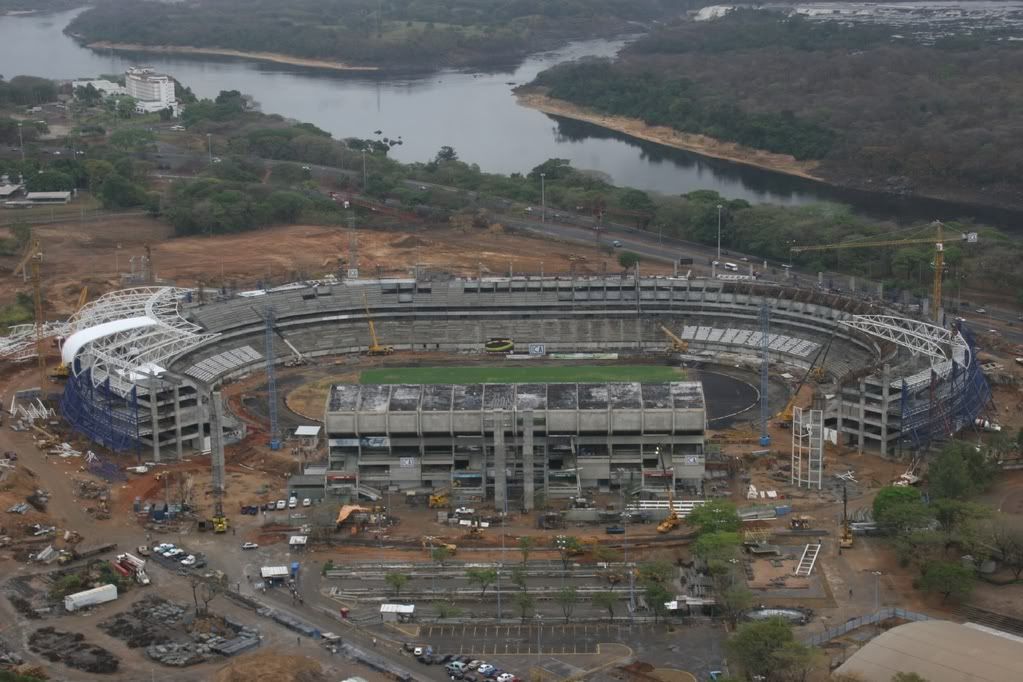

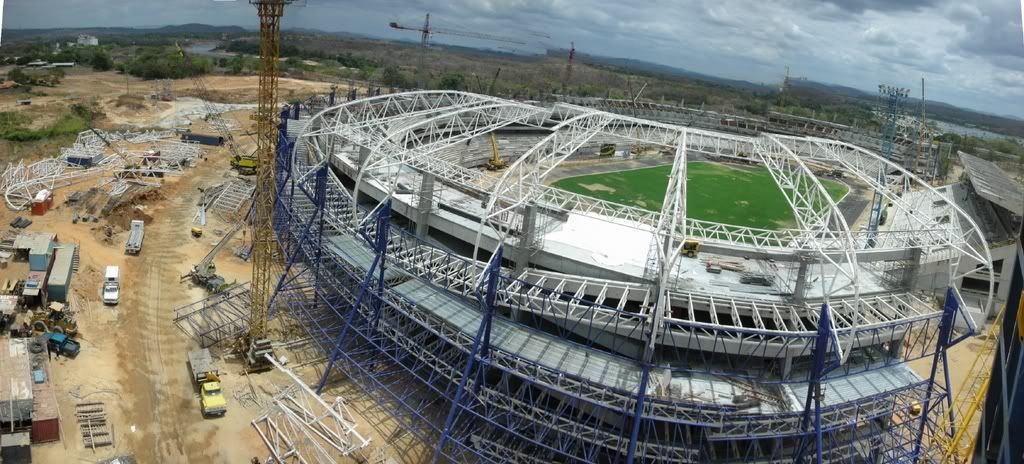
I thought this was an interesting picture of the big trusses being lifted into place:
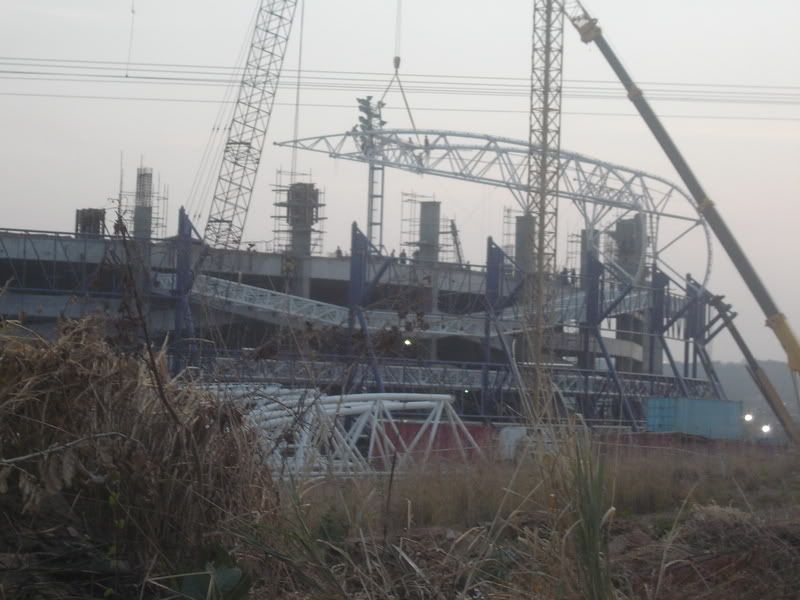
All this for some non-sense that barely qualifies as a sport.
As an aside, I noticed during the soccer tournament last summer (sorry I can't remember what it was called at the moment) the opposition went ga-ga over soccer. A number oppososition bloggers even stopped their political drivel long enough to post drivel about soccer.
After having watched a couple of soccer games I think I have figured out why the Venezuelan opposition relates to it so much. The main point of soccer seems to be to flop on the ground, roll around and scream as if you are in pain, and hope someone will do you the great favor of calling a penalty on the other team. All the while you are in reality perfectly fine.
Well, isn't that just what the Venezuelan opposition does? They go on TV or the internet, complain about the whole place falling apart, pretend they are suffering through unbearable agony under Chavez, and hope someone from up north will maybe take pity and come to their rescue. In reality of course they haven't had things so good in decades.
So the whiners relate to the whiney little sport soccer is. Makes perfect sense to me.
|
It seems to me they are overdoing it. Some of these stadiums can hold 50,000 or 60,000 spectators. Are there that many people who would even want to see a soccer game? Personally I'd rather suffer through golf, or table tennis, or bowling or even baseball before getting so desperate as to watch a soccer game.
Anyways, they are racing to complete these stadiums in time for the tournament. Here is just one - a completely rebuilt statium in eastern Venezuela:




I thought this was an interesting picture of the big trusses being lifted into place:

All this for some non-sense that barely qualifies as a sport.
As an aside, I noticed during the soccer tournament last summer (sorry I can't remember what it was called at the moment) the opposition went ga-ga over soccer. A number oppososition bloggers even stopped their political drivel long enough to post drivel about soccer.
After having watched a couple of soccer games I think I have figured out why the Venezuelan opposition relates to it so much. The main point of soccer seems to be to flop on the ground, roll around and scream as if you are in pain, and hope someone will do you the great favor of calling a penalty on the other team. All the while you are in reality perfectly fine.
Well, isn't that just what the Venezuelan opposition does? They go on TV or the internet, complain about the whole place falling apart, pretend they are suffering through unbearable agony under Chavez, and hope someone from up north will maybe take pity and come to their rescue. In reality of course they haven't had things so good in decades.
So the whiners relate to the whiney little sport soccer is. Makes perfect sense to me.
|
Tuesday, March 27, 2007
Cut from the same cloth
Sometimes to gain insight regarding one place, you have to observe another. Such is the case today when today a Pakastani writer articulated the true sentiments of the Venezuelan opposition better than anyone:
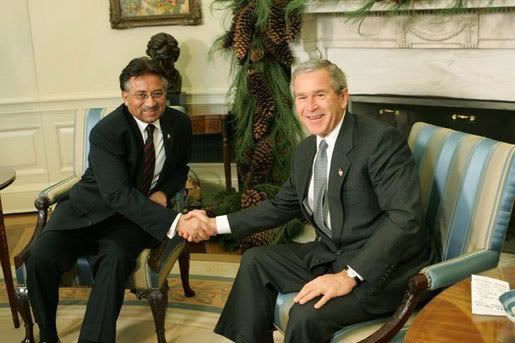
His wife is an actress, his sister a journalist, his dad a university professor - clearly a person cut from a certain cloth - wealthy, urbane, sophisticated, educated, to his mind I'm sure, deserving. Of course, it's not easy being those things in a country of 165 million dominated by poverty and illiteracy, as Pakistan is. No one ever said it was all a bed of roses for the elite.
I guess that explains why someone so educated and sophisticated has no problems supporting a government that is as illiberal as they come. Why should it concern him that tens of millions of poor people have no voice as long as the multi millionaires who own the media are allowed to be "free and vibrant"? And isn't it great that journalism lecturers like his sister get to have their financing and salaries increased - no matter that there are virtually no educational opportunities for most Pakistanis.
What matters to the elite is... the elite. They don't care about poverty. They don't care about freedoms (apart from their own). They are willing to walk into a voting booth and vote for a dictator - as long as that dictator perpetuates their privileges and protects them from the rabble.
So it is in Pakistan. So it is in Thailand. And so it is in Venezuela.
The Venezuelan opposition likes to pretend it cares about a lot of things: good government, democracy, freedom, the poor. In reality they don't care about any of those things.
Whatever they say about any of those things the reality is they are only rhetorical weapons to remove a government that doesn't serve their interests and to rescue their endangered privaleges. In reality they have no more use for democracy, freedom, or human rights than their Pakistani counterparts.
Witness their support of a coup against a democratically elected government. Witness their support of devestating oil strike aimed at toppling that same government. Witness their fighting tooth and nail virtually every anti-poverty program Chavez has divised - until they thought they could make political gains by pretending to support them. Witness how they complain so bitterly when fortunes are reversed.
Strip away all the fancy rhetoric learned at places like Oxford and Harvard and all you are left with is a crass elite, be it Pakistani, Thailandese or Venezuelan, that is concerned about nothing more than its own privileges and status. We've seen this picture before.
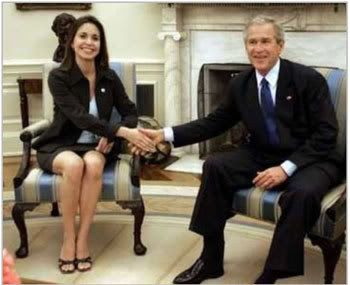
|

I was one of the few Pakistanis who actually voted for Gen. Pervez Musharraf in the rigged referendum of 2002. I recall walking into a polling station in Islamabad and not seeing any other voter. When I took the time required to read the convoluted ballot, I was accosted by a man who had the overbearing attitude of a soldier although he was in civilian clothes. He insisted that I hurry, which I refused to do. He then hovered close by, watching my every action, in complete defiance of electoral rules.
Despite this intimidation, I still voted in favor of the proposition that General Musharraf, who had seized power in a coup in 1999, should continue as Pakistan’s president for five more years. I believed his rule had brought us much-needed stability, respite from the venal and self-serving elected politicians who had misgoverned Pakistan in the 1990s, and a more free and vibrant press than at any time in the country’s history.
The outcome of the referendum — 98 percent support for General Musharraf from an astonishing 50 percent turnout — was so obviously false that even he felt compelled to disown the exercise.
Rigged elections rankle, of course. But since then, secular, liberal Pakistanis like myself have seen many benefits from General Musharraf’s rule. My wife was an actress in “Jutt and Bond,” a popular Pakistani sitcom about a Punjabi folk hero and a debonair British agent. Her show was on one of the many private television channels that have been permitted to operate in the country, featuring everything from local rock music to a talk show whose host is a transvestite.
My sister, a journalism lecturer in Lahore, loves to tell me about the enormous growth in recent years in university financing, academic salaries and undergraduate enrollment. And my father, now retired but for much of his career a professor of economics, says he has never seen such a dynamic and exciting time in Pakistani higher education.
His wife is an actress, his sister a journalist, his dad a university professor - clearly a person cut from a certain cloth - wealthy, urbane, sophisticated, educated, to his mind I'm sure, deserving. Of course, it's not easy being those things in a country of 165 million dominated by poverty and illiteracy, as Pakistan is. No one ever said it was all a bed of roses for the elite.
I guess that explains why someone so educated and sophisticated has no problems supporting a government that is as illiberal as they come. Why should it concern him that tens of millions of poor people have no voice as long as the multi millionaires who own the media are allowed to be "free and vibrant"? And isn't it great that journalism lecturers like his sister get to have their financing and salaries increased - no matter that there are virtually no educational opportunities for most Pakistanis.
What matters to the elite is... the elite. They don't care about poverty. They don't care about freedoms (apart from their own). They are willing to walk into a voting booth and vote for a dictator - as long as that dictator perpetuates their privileges and protects them from the rabble.
So it is in Pakistan. So it is in Thailand. And so it is in Venezuela.
The Venezuelan opposition likes to pretend it cares about a lot of things: good government, democracy, freedom, the poor. In reality they don't care about any of those things.
Whatever they say about any of those things the reality is they are only rhetorical weapons to remove a government that doesn't serve their interests and to rescue their endangered privaleges. In reality they have no more use for democracy, freedom, or human rights than their Pakistani counterparts.
Witness their support of a coup against a democratically elected government. Witness their support of devestating oil strike aimed at toppling that same government. Witness their fighting tooth and nail virtually every anti-poverty program Chavez has divised - until they thought they could make political gains by pretending to support them. Witness how they complain so bitterly when fortunes are reversed.
Strip away all the fancy rhetoric learned at places like Oxford and Harvard and all you are left with is a crass elite, be it Pakistani, Thailandese or Venezuelan, that is concerned about nothing more than its own privileges and status. We've seen this picture before.

|
Monday, March 26, 2007
Where are the adults when you need them?
Of all the things the opposition likes to bitch, moan, and whine about one of the silliest is that there are no independent institutions in Venezuela. Supposedly Chavez controls everything. Yeah, sure.
I do have to confess, there are times when I think it would be better if Chavez really did exercise control over everything. It could hardly be worse than having the current joke of a Supreme Court issuing some, let us say for lack of a better term, breathtaking rulings.
Of course, the most (in)famous such ruling was back in 2002 when the court ruled that people could not be tried for overthrowing the government on April 11, 2002. There was no coup – it was a “power vacuum” they said. A “vacuum”?!?! What an interesting concept. “No officer, I dind’t steal Mr. Jones car. It was parked on the street, no-one was around, there was an ownership “vacuum”, and I stepped in to fill the vacuum.”
Anyways, while the Supreme Court hasn’t issued as absurd of a ruling since then it’s not as if it hasn’t tried. Take its recent ruling on income taxes. The Constitutional Chamber of the Supreme Court ruled that income tax could not be applied against irregular income, or bonuses, but only against base income.
In the case of Venezuela this is no small thing. Most people in Venezuela get a large part of their salaries in the form of year end bonuses that are various multiples of a months salary. For example, in Venezuela’s Central University employees get paid the equivalent of 17.33 months each year – twelve months as regular pay and 5.33 months in the form of bonuses. This is common throughout Venezuela. What the court has decided is that people should be subject to taxes only on the 12 months of their salary and not the 5.33 months (in the case of the Central University) of bonus they receive.
Sure seems absurd to me. Bonuses sometimes get paid in the United States too. The huge multi-million dollar signing bonuses that football players get paid come to mind. I’d sure be more than a little upset if some court decided my measly little salary should be taxed but a $20 million signing bonus is exempt from taxes.
Theoretically the job of this “Constitutional Chamber” is to determine if laws are Constitutional or not. So maybe we should take a look at what the Venezuelan Constitution says about taxes:
I sure don’t see anything in there that would make it unconstitutional to tax bonuses. In fact, given that in accordance with the above provision taxes are supposed to be progressive it would seem that NOT taxing bonuses is what would be unconstitutional.
Be that as it may the Supreme Court made its ruling. So now the government will be losing gobs of tax revenue (yeah, Chavez wants less tax revenue so I’m sure he must have used his control over all institutions to tell the Supreme Court to screw up his governments tax system!?!?). Worse still, it is even conceivable they could have to refund lots of taxes to some rather wealthy Venezuelans. And oh, yeah, lest we forget, the highly paid Supreme Court justices also get some pretty big bonuses – so in effect they just gave themselves a hefty tax cut. Maybe that is their way at getting back at Chavez for saying that the salaries of high government officials needed to be cut.
With this ruling all hell has broken loose. The National Assembly is more than a little steamed that their tax law has in effect been re-written to lighten the tax burden of the rich. What’s more, they claim that the Supreme Court has moved in to their turf by declining to do what is within its purview, declaring the law unconstitutional, but rather in effect legislating by changing the law. According to the National Assembly only the legislature and President can change or modify laws. Constitutional lawyers seem to agree with this.
Currently the National Assembly has formed a committee to in essence figure out what it is going going to do about this. The Supreme Court as a whole (as opposed to the one chamber that made this decision) seems to be at a loss for what to do. So this soap opera looks likely to continue.
I personally don’t know what the solution is. But it does seem that the Venezuelan Supreme Court is in need of some adult supervision. Seeing as Chavez is accused of controlling every aspect of the Venezuelan government anyways, maybe he should go ahead and give it some.
|
I do have to confess, there are times when I think it would be better if Chavez really did exercise control over everything. It could hardly be worse than having the current joke of a Supreme Court issuing some, let us say for lack of a better term, breathtaking rulings.
Of course, the most (in)famous such ruling was back in 2002 when the court ruled that people could not be tried for overthrowing the government on April 11, 2002. There was no coup – it was a “power vacuum” they said. A “vacuum”?!?! What an interesting concept. “No officer, I dind’t steal Mr. Jones car. It was parked on the street, no-one was around, there was an ownership “vacuum”, and I stepped in to fill the vacuum.”
Anyways, while the Supreme Court hasn’t issued as absurd of a ruling since then it’s not as if it hasn’t tried. Take its recent ruling on income taxes. The Constitutional Chamber of the Supreme Court ruled that income tax could not be applied against irregular income, or bonuses, but only against base income.
In the case of Venezuela this is no small thing. Most people in Venezuela get a large part of their salaries in the form of year end bonuses that are various multiples of a months salary. For example, in Venezuela’s Central University employees get paid the equivalent of 17.33 months each year – twelve months as regular pay and 5.33 months in the form of bonuses. This is common throughout Venezuela. What the court has decided is that people should be subject to taxes only on the 12 months of their salary and not the 5.33 months (in the case of the Central University) of bonus they receive.
Sure seems absurd to me. Bonuses sometimes get paid in the United States too. The huge multi-million dollar signing bonuses that football players get paid come to mind. I’d sure be more than a little upset if some court decided my measly little salary should be taxed but a $20 million signing bonus is exempt from taxes.
Theoretically the job of this “Constitutional Chamber” is to determine if laws are Constitutional or not. So maybe we should take a look at what the Venezuelan Constitution says about taxes:
Article 316: The taxation system shall seek a fair distribution of public burdens in accordance with the taxpayer’s ability to pay, taking into account the principle of progressive taxation, as well as protection of the national economy and raising the standard of living of the population, the foundation therefore being an efficient system for the collection of taxes.
I sure don’t see anything in there that would make it unconstitutional to tax bonuses. In fact, given that in accordance with the above provision taxes are supposed to be progressive it would seem that NOT taxing bonuses is what would be unconstitutional.
Be that as it may the Supreme Court made its ruling. So now the government will be losing gobs of tax revenue (yeah, Chavez wants less tax revenue so I’m sure he must have used his control over all institutions to tell the Supreme Court to screw up his governments tax system!?!?). Worse still, it is even conceivable they could have to refund lots of taxes to some rather wealthy Venezuelans. And oh, yeah, lest we forget, the highly paid Supreme Court justices also get some pretty big bonuses – so in effect they just gave themselves a hefty tax cut. Maybe that is their way at getting back at Chavez for saying that the salaries of high government officials needed to be cut.
With this ruling all hell has broken loose. The National Assembly is more than a little steamed that their tax law has in effect been re-written to lighten the tax burden of the rich. What’s more, they claim that the Supreme Court has moved in to their turf by declining to do what is within its purview, declaring the law unconstitutional, but rather in effect legislating by changing the law. According to the National Assembly only the legislature and President can change or modify laws. Constitutional lawyers seem to agree with this.
Currently the National Assembly has formed a committee to in essence figure out what it is going going to do about this. The Supreme Court as a whole (as opposed to the one chamber that made this decision) seems to be at a loss for what to do. So this soap opera looks likely to continue.
I personally don’t know what the solution is. But it does seem that the Venezuelan Supreme Court is in need of some adult supervision. Seeing as Chavez is accused of controlling every aspect of the Venezuelan government anyways, maybe he should go ahead and give it some.
|
I sure hope they don't emulate these people
As is well known, President Chavez is considering asking that the Venezuelan constitution be modified. Why a document that is only 7 years old needs to be modified already is beyond me (though abolishing the Supreme Court could be a good idea, more on that later).
I just hope that when Venezuelans do get around to modifying their constitution they don't take these people as their example:
Truth be told though, even without any changes in the Constitution things are pretty bad in Egypt:
Wow, four years in prison for criticizing the president in your blog. I can think of some people who must be really happy they live in Venezuela and not in Egypt.
What is even more interesting here is that the Egyptian governments sugar, who criticizes the Venezuelan government if they so much as criticize their opponents, doesn't let any of this get in the way of their great friendship:
And Condi Rice seems completely unphased:
Amazing, the country hasn't had open and free elections in decades, has a president for more than 25 years that is now grooming his son for office, and where anyone who dare question this risks serious jail time and Condi doesn't bat an eyelid.
Yet with respect to a country that has had four votes on its president in the past four years, all monitored and judged free and fair by international observers, and that doesn't even bother to jail silly opposition bloggers she had this to say:
"I believe there is an assault on democracy in Venezuela and I believe that there are significant human rights issues in Venezuela. I do believe that the president of Venezuela is really, really destroying his own country, economically, politically."
Interesting how a country with a fully functional democracy, unfettered liberties, and respect for human rights gets so harshly criticized if it so much as has a pimple. Meanwhile, a country with barely a pretense of democracy or human rights is lavished with money and is told “don’t worry about it, do things your own way”. Could almost make you think Ms. Rice has something personal against Chavez doesn’t it.
But in reality I don’t think that is what it is about. More likely, it is just the same old self-serving hypocrisy that has characterized U.S. foreign policy for well more than a century.
|
I just hope that when Venezuelans do get around to modifying their constitution they don't take these people as their example:
Egyptian officials are hoping to add powers to the Constitution that would allow the president to more easily dissolve Parliament and give him free rein to suspend civil liberties and imprison anyone deemed a terrorist threat.
...................................
The sharpest debate has been over three areas of proposed change. One would ultimately allow broad powers to monitor and detain people accused of terrorist activities while not specifically defining terrorism. Another would limit the role of judges in monitoring elections, which are often mired in accusations of fraud. And a third would prohibit the creation of any religious political parties.
Truth be told though, even without any changes in the Constitution things are pretty bad in Egypt:
The move is occurring at a time when the government is showing less tolerance for criticism and political opposition. It has jailed opposition critics, including a member of Parliament and a former presidential candidate; it delayed local council elections by two years; it sentenced a blogger who had criticized the president to four years in prison; it has had troops fire on would-be voters to keep them away from the polls; and it has cracked down on the Muslim Brotherhood, arresting members and freezing assets.
Wow, four years in prison for criticizing the president in your blog. I can think of some people who must be really happy they live in Venezuela and not in Egypt.
What is even more interesting here is that the Egyptian governments sugar, who criticizes the Venezuelan government if they so much as criticize their opponents, doesn't let any of this get in the way of their great friendship:
Egypt receives about $1.7 billion a year in American military and development aid, and at one time was held up by the White House as the vanguard for Democratic changes in the region. But the Bush administration’s pressure on Mr. Mubarak to enact such changes has evaporated as it has increasingly sought help in dealing with Iran, Iraq and the Israeli-Palestinian peace process.
And Condi Rice seems completely unphased:
Rice said Washington was not trying to give orders to Egypt how to proceed with reforms. ``We recognize that states do this in their own way, and that they do it in a way that is consistent with their own cultural circumstances,'' she said.
``It is not a matter to try to dictate to Egypt how this unfolds, but it is a matter to say that Egypt is an extremely important country. That when Egypt leads, people listen.''
Amazing, the country hasn't had open and free elections in decades, has a president for more than 25 years that is now grooming his son for office, and where anyone who dare question this risks serious jail time and Condi doesn't bat an eyelid.
Yet with respect to a country that has had four votes on its president in the past four years, all monitored and judged free and fair by international observers, and that doesn't even bother to jail silly opposition bloggers she had this to say:
"I believe there is an assault on democracy in Venezuela and I believe that there are significant human rights issues in Venezuela. I do believe that the president of Venezuela is really, really destroying his own country, economically, politically."
Interesting how a country with a fully functional democracy, unfettered liberties, and respect for human rights gets so harshly criticized if it so much as has a pimple. Meanwhile, a country with barely a pretense of democracy or human rights is lavished with money and is told “don’t worry about it, do things your own way”. Could almost make you think Ms. Rice has something personal against Chavez doesn’t it.
But in reality I don’t think that is what it is about. More likely, it is just the same old self-serving hypocrisy that has characterized U.S. foreign policy for well more than a century.
|
Sunday, March 25, 2007
Too good to pass up.
I know I've done more posts on the new bridge leading into Caracas than I probably should but I have to say watching this thing get built is really interesting. I've never seen this construction technique before.
As people probably already know the bridge consists of a number of concret support towers. A huge steel truss that will ultimately serve as the road bed is being fabricated at one end and then slowly pushed out over the towers as it is built.
Here again is a picture of the "nose" of the bridge which is being pushed foward:
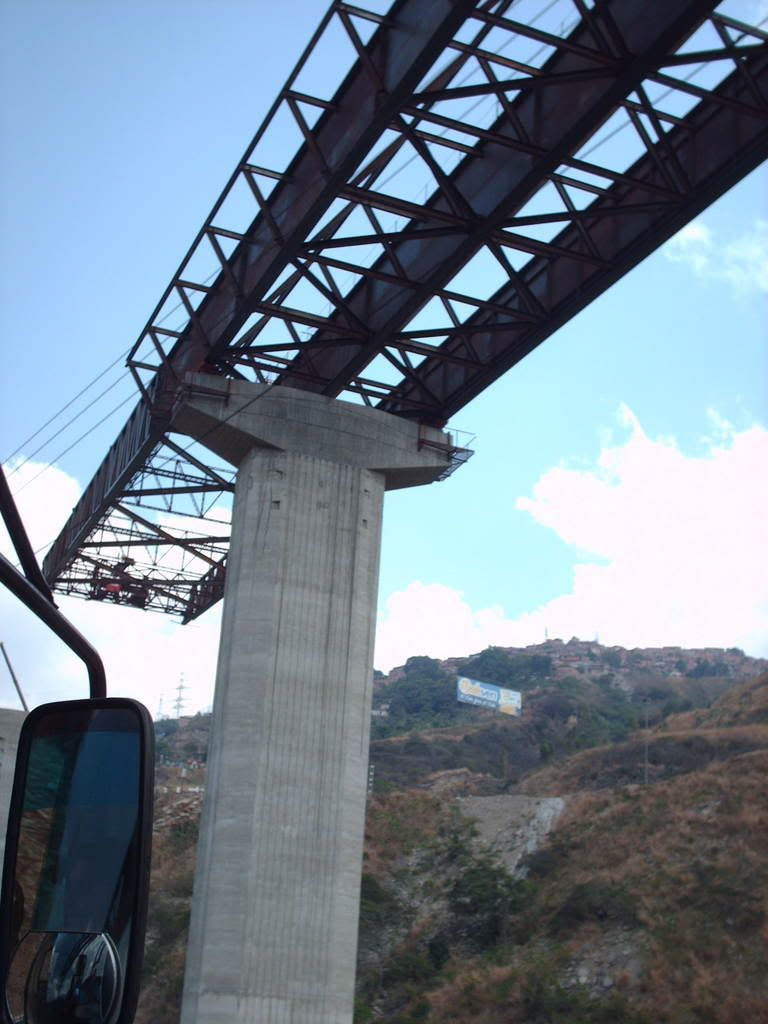
And here is another shot of the large steel lattice resting on the towers:
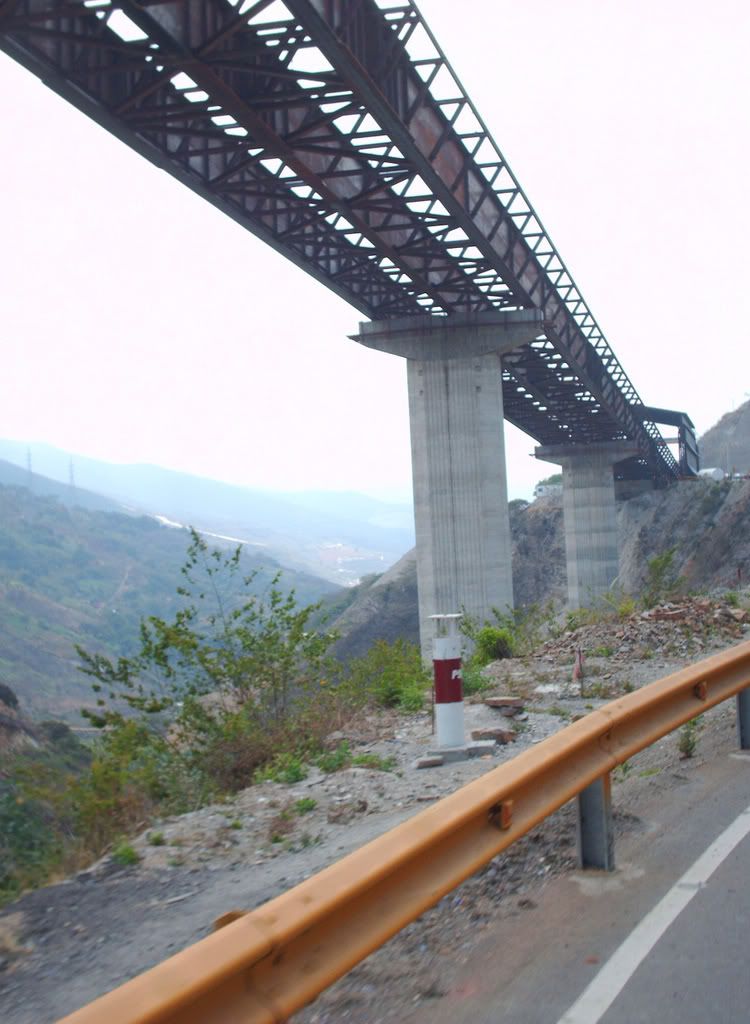
Note this steel work is not where it will ultimately reside. It is all being pushed as one unit towards the other end of the bridge. Quite a mass of steel to be pushing along!!
And what really made me want to post these pictures is this one:
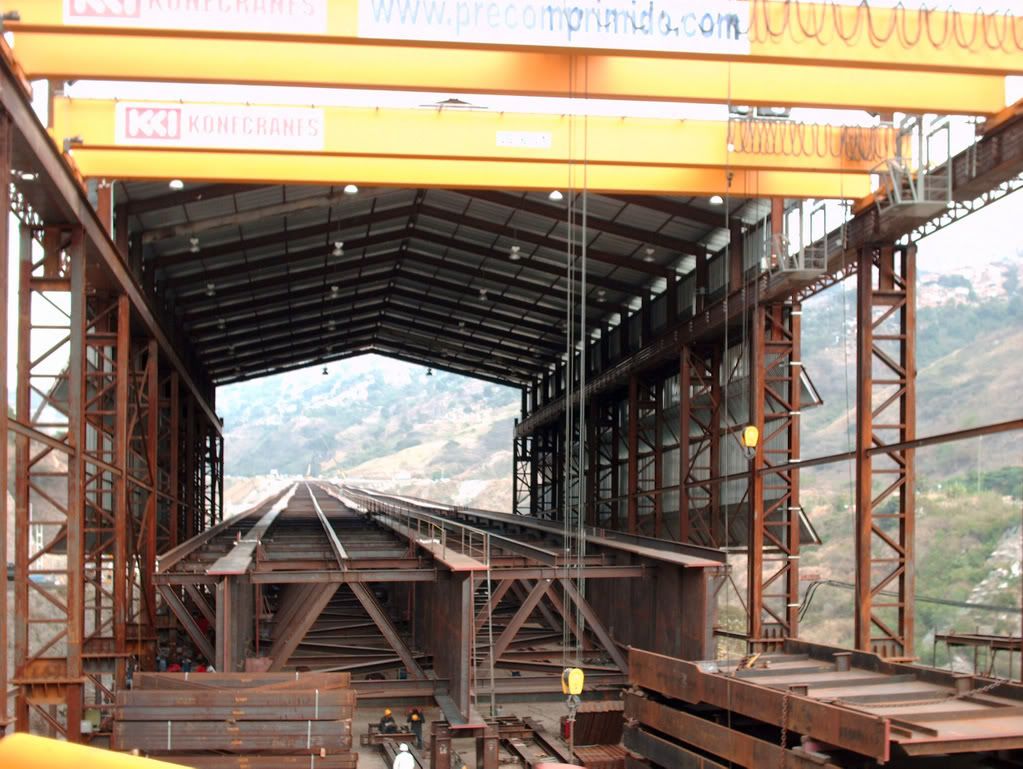
This is the assembly area where the steel lattice is put together and then pushed out over the concret pillors to form the bridge. Note the wokers in the bottom forground. Better than any picture this shows the scale of this and how huge this bridge is.
It is one thing to see it suspended in the air. But when you see a picture so as this that lends some scale to it it is truly impressive.
The following video also shows the construction and at the end has some good shots which show the scale of the public work project:
The bridge should be completed in about three months. And the first stage, constructing the concrete pillors and putting in place the steel bridge structure is expected to be done in less than two weeks. In fact, here is a picture of the final support column:
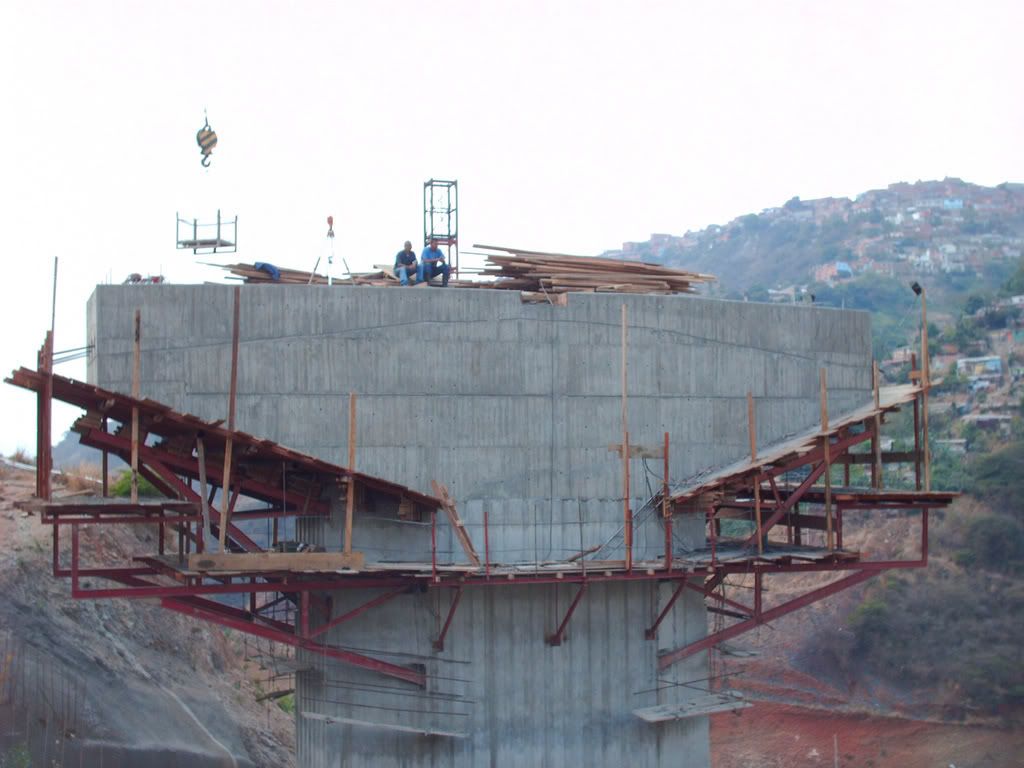
Just about done!
By the way, it should be noted this new bridge is not the only thing being done to spruce up the route. Due to the nature of the terrain not only are there bridges, but tunnels as well. For years they have been filthy and dimly lit. No more:
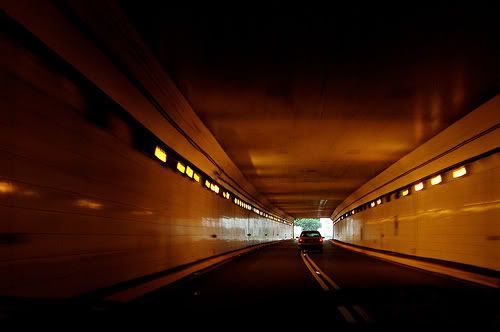
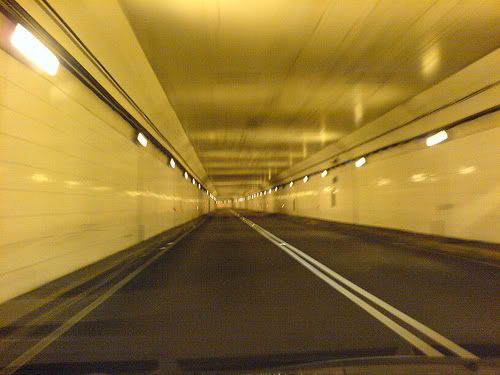
Now they look like brand new.
Also, given the steep grade down from Caracas to the ocean run away trucks with failed brakes are always a concern and have led to some horrible accidents over the years. Finally Venezuela has a government that decided to do something about it. The route now has two new emergency braking ramps for out of control vehicles:
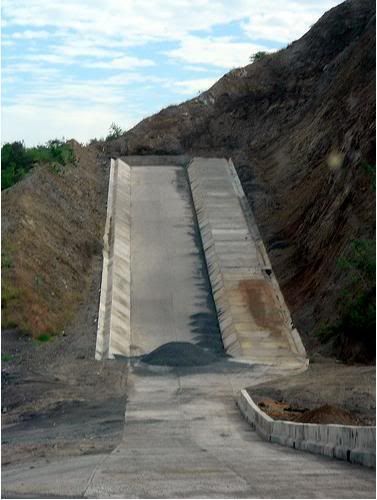
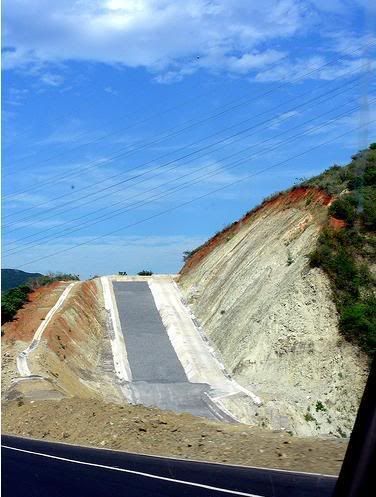
Nice to see the Venezuelan government is not only doing lots of things, but doing them well!
|
As people probably already know the bridge consists of a number of concret support towers. A huge steel truss that will ultimately serve as the road bed is being fabricated at one end and then slowly pushed out over the towers as it is built.
Here again is a picture of the "nose" of the bridge which is being pushed foward:

And here is another shot of the large steel lattice resting on the towers:

Note this steel work is not where it will ultimately reside. It is all being pushed as one unit towards the other end of the bridge. Quite a mass of steel to be pushing along!!
And what really made me want to post these pictures is this one:

This is the assembly area where the steel lattice is put together and then pushed out over the concret pillors to form the bridge. Note the wokers in the bottom forground. Better than any picture this shows the scale of this and how huge this bridge is.
It is one thing to see it suspended in the air. But when you see a picture so as this that lends some scale to it it is truly impressive.
The following video also shows the construction and at the end has some good shots which show the scale of the public work project:
The bridge should be completed in about three months. And the first stage, constructing the concrete pillors and putting in place the steel bridge structure is expected to be done in less than two weeks. In fact, here is a picture of the final support column:

Just about done!
By the way, it should be noted this new bridge is not the only thing being done to spruce up the route. Due to the nature of the terrain not only are there bridges, but tunnels as well. For years they have been filthy and dimly lit. No more:


Now they look like brand new.
Also, given the steep grade down from Caracas to the ocean run away trucks with failed brakes are always a concern and have led to some horrible accidents over the years. Finally Venezuela has a government that decided to do something about it. The route now has two new emergency braking ramps for out of control vehicles:


Nice to see the Venezuelan government is not only doing lots of things, but doing them well!
|
